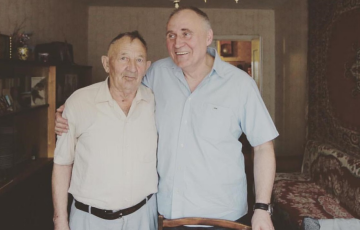We'll Wait
8- IRYNA KHALIP
- 22.03.2024, 13:08
- 21,246

In memory of Viktar Statkevich
Why the hell are we talking about death again? It’s spring all around, birds, flowers, allow yourself something positive already, enough about the tragic. I'm honestly trying. And I might even have succeeded if Viktar Statkevich had not died the other day. The father of the Belarusian hero, no less heroically waiting for his son from prison.
It would seem that one can envy Viktar Statkevich: he lived for 98 years. And he managed to meet his son from the camps several times, although he was afraid that he would not make it. It’s a long, long life. Worthy sons, grandsons, great-grandsons. But he survived the war as a child - and died in the war, too: for the last two years, Viktar Statkevich lived in Ukraine, with his eldest son Aliaksandr. When missiles are flying overhead, and the youngest son is somewhere far away in a dungeon for a long time, and for more than a year there is no news, no calls, no hope of meeting - this is a very difficult end to life. And no one knows whether Mikalai Statkevich will be informed about his father’s death.
Viktar was a teacher. Unlike the impostor who calls himself a historian, Viktar Statkevich actually taught history to children. And in the early eighties, he used to go “to the north” to work in order to earn a good pension thanks to northern bonuses. He worked at a construction site, temporarily forgetting about his teacher’s diploma: he needed to feed his family, he needed to help his sons. And he was helping, even when he was already retired. He was cost-conscious and householdly: when during Mikalai’s previous imprisonment, independent journalists came to visit Viktar, he went out to see them off and at the same time go to the newsstand for the latest press. Back then, you could still buy Narodnaya Volia, Svabodnyja Naviny, and Baranavichy-based Intex-press at the kiosk. Viktar Statkevich explained to journalists that it makes no sense to subscribe to newspapers: he is well over eighty, every day could be his last, so why spend money in advance if he may not read these newspapers? It makes more sense to go to the kiosk every day.
In 2011, when presidential candidate Mikalai Statkevich was in a KGB pre-trial detention center awaiting trial for protesting on December 19, Viktar went to Ukraine for his grandson’s wedding. Many of us then thought that he would stay there, living in the family of his eldest son. But Viktar Statkevich returned to Baranavichy to wait for letters from Mikalai. And maybe to wait till he is released. “How can I leave from here, where my second son is in trouble, where I have already shed so many tears that all the offenders would drown in them if they could? ” he told Intex-press journalists. “And how can I leave from here if letters from my son arrive here?” When he will be tried here soon? I am afraid that I will not wait for my Mikalai to be free. So I want to meet him at least in court.”
Then Viktar finally saw Mikalai to come free. Although the chasteners tried to ruin the life of not only the son, but also of the father. They used to attach St. George's ribbons to the fence and throw in threatening letters. Imagine what it’s like for a man who’s nearly 90 years old, who lives only by letters from his son and the desperate hope of a meeting, to pull out anonymous letters from his mailbox, which say that if his son Mikalai is released, he will be killed. What kind of bastard came up with the idea of writing such a thing to a lonely elderly man, we don’t know and will probably never know. Although Mikalai’s wife Maryna then insisted on contacting the police about the threats. However, we all know very well what the police do with such complaints.
Nevertheless, Viktar then held on with all his might. He was waiting for his son. In 2011, he managed to go on a short visit to the colony before Mikalai was transferred to prison regime. After the meeting, however, he told reporters that when he saw the emaciated, pale Mikalai, he cried all night. But no one saw him crying - in public, Viktar was always smiling and calm. And what he cried about at night remained within the walls of his apartment, sometimes breaking through with confessions to local activists and the guys from the Intex-press newspaper who visited Viktar Statkevich.
There is no longer that Baranavichy newspaper that was always writing news about Viktar Statkevich. His apartment in Zhukov Street is empty. And Viktar is not there anymore. Remembering him and waiting for Mikalai to be free is all we can do for the sake of his memory. Not a lot? Well, for these times – it’s a lot.
Iryna Khalip, specially for Charter97.org









